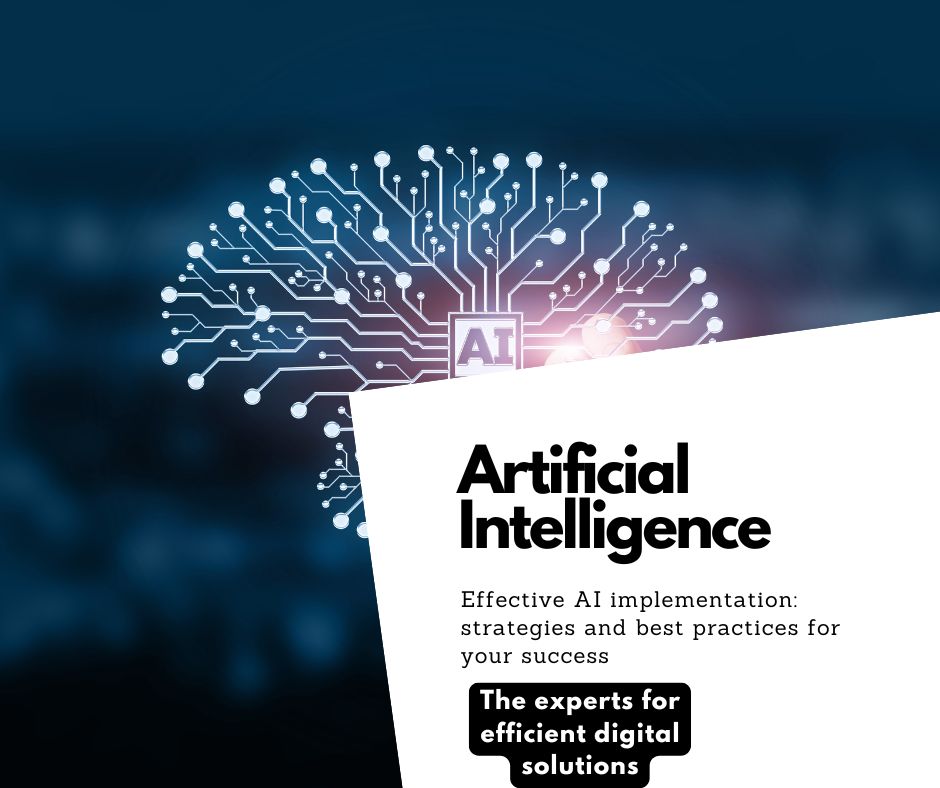Effective AI implementation: strategies and best practices for your success

For many companies, the implementation of artificial intelligence (AI) is a decisive step towards digitalization and increased efficiency. However, while the possibilities offered by AI are almost limitless, companies often face the challenge of integrating these technologies effectively. A well-thought-out implementation process is therefore key to achieving the desired results and maximizing ROI.
In this article, we take an in-depth look at the strategies and best practices for successful AI implementation. We will highlight the key steps in the implementation process, the tools that can support you and the important metrics that will help you measure the success of your AI projects. We will also present two case studies that show how companies have successfully integrated AI into their business processes. Whether you run a small business or a large corporation, the right approaches to AI implementation can make the difference between success and failure. Let’s explore together the possibilities that Artificial Intelligence holds for your business!
Step-by-step approach to AI implementation
The successful implementation of artificial intelligence requires a structured and well-thought-out approach. Here are the key steps you should consider when implementing AI:
Through this structured step-by-step approach, you can ensure that your AI implementation is successful and delivers sustainable results for your company.


Tools that support you
When implementing artificial intelligence, the right tools play a crucial role in optimizing the process and increasing efficiency. Here are some of the most important tools that can help you with AI implementation:
Data management tools
These tools help you to collect, store and process data. The most popular include:
- Apache Hadoop: A framework for storing and processing large amounts of data.
- Microsoft Azure Data Factory: A cloud service for data integration and transformation.
- Talend: A data integration platform that makes it possible to connect and transform data from different sources.
Machine learning frameworks
These frameworks provide the necessary infrastructure for the development, training and validation of AI models:
- TensorFlow: An open source framework from Google for machine learning that supports a wide range of algorithms.
- PyTorch: Another popular open source framework developed by Facebook that is particularly suitable for research and prototyping.
- Scikit-learn: A library for machine learning in Python that is easy to use and great for smaller projects.
Development and testing tools
These tools support the programming, testing and monitoring of AI models:
- Jupyter Notebook: An interactive development tool that allows you to run code and create documentation at the same time.
- Kubernetes: A platform for managing containerized applications that facilitates the scaling and deployment of AI models.
- MLflow: An open-source tool for managing the entire lifecycle of machine learning projects, including experiment tracking and model management.
Visualization tools
These tools help you to visualize data and results to make analysis easier:
- Tableau: A data visualization platform that creates interactive dashboards and reports.
- Power BI: A business intelligence tool from Microsoft that allows you to visualize data and gain insights.
- Matplotlib: A Python library for creating static, animated and interactive graphics.
By using these tools, you can significantly simplify and accelerate the AI implementation process. They help you to work in a structured way, use data efficiently and continuously improve the quality of your AI solutions.
Key performance indicators for AI implementations
The implementation of artificial intelligence (AI) is a complex process whose success should be measured by specific metrics. Success metrics help evaluate the performance of AI solutions and quantify their impact on business goals. Here are some of the most important KPIs you should consider when evaluating your AI implementation:
Accuracy of the model
F1 score
User acceptance
ROI (return on investment)
Processing times
Customer satisfaction
Data quality
By regularly monitoring these success metrics, you can evaluate the effectiveness of your AI implementation, make adjustments and ensure that the solution meets both your company’s needs and your customers’ expectations.


Best practices for AI implementation
The successful implementation of artificial intelligence (AI) requires not only the right technology, but also proven strategies and procedures. Here are some best practices that can help you implement your AI projects effectively:
By following these best practices, you can ensure that your AI implementation is not only successful, but also delivers sustainable results for your business. By applying these best practices, you will lay the foundation for a successful digital transformation and maximize the value of your AI investment.
Case study 1: Automating customer service with an AI chatbot
Background:
A medium-sized online retailer was struggling to process the increasing number of customer inquiries efficiently. The existing support team was overloaded and customer waiting times were increasing. To improve customer satisfaction and reduce operating costs, the company decided to implement an AI-powered chatbot.
Solution:
We developed an AI chatbot that was able to answer frequent customer queries automatically. The chatbot was equipped with an extensive database of FAQs and natural language processing (NLP) technology to understand customer queries and provide appropriate answers. We also integrated a seamless handover to human agents for more complex queries.
Result:
After implementing the chatbot, the online retailer was able to reduce the processing time for customer inquiries by 50%. Customers received faster responses, which led to a significant improvement in customer satisfaction. In addition, the company was able to reduce its operating costs by 30% as fewer staff were required to handle simple requests. The chatbot proved to be a valuable tool that made customer service more efficient and responsive.


Case study 2: AI-supported data analysis in a financial services company
Background:
A financial services company was faced with the challenge of analyzing large amounts of data efficiently in order to make informed decisions. Manual data processing was time-consuming and error-prone, which impacted decision-making. The company was looking for a solution that could improve both the efficiency and accuracy of data analysis.
Solution:
We developed a customized AI solution based on machine learning. This solution integrated various data sources, including internal CRM data and external market data. By using advanced algorithms to analyze data, the system was able to identify trends and patterns that had previously remained hidden from analysts. In addition, a user-friendly dashboard interface was developed that allowed users to visualize and analyze data in real time.
Result:
The implementation of the AI solution led to a significant increase in efficiency: data analysis times were reduced by 60% and the accuracy of predictions improved considerably. Analysts were now able to make more informed decisions faster, which led to an increase in sales and improved customer satisfaction. The solution enabled the company to strengthen its market position and develop proactive strategies.

Implementing Artificial Intelligence is not only a technological challenge, but also a strategic decision that has the potential to transform the entire business landscape. By taking an informed approach and applying best practices, companies can not only increase their efficiency, but also create innovative solutions that ensure long-term success. At DMG, we help our customers successfully navigate this journey and realize the full benefits of AI.
Till Neitzke
Conclusion: Effective AI implementation
The implementation of artificial intelligence (AI) offers companies a unique opportunity to optimize their processes, improve decisions and develop innovative solutions. However, effective AI implementation requires a structured approach and adherence to proven strategies.
In this article, we have presented the key steps of the AI implementation process, the most important processes as well as supporting tools and best practices. The case studies illustrate how companies have been able to achieve significant results through data-driven approaches and targeted measures.
To ensure the success of your AI initiatives, it is crucial to set clear goals, guarantee the quality of the data and form an interdisciplinary team. In addition, agile methods, continuous monitoring and regular training should be an integral part of your strategy.
By taking these elements into account, you create the basis for a successful digital transformation and maximize the value of your AI investments. The future lies in the ability to see AI not just as a tool, but as a strategic partner in the development and realization of your business goals. Take advantage of the opportunities that AI offers to take your business to the next level!

Successful together in the digital transformation –
Your introductory meeting with DMG
In our introductory meeting we will discuss
- what your current challenges are in digital projects
- how other companies have done it and how you can use this to your advantage.
- what needs to be done now and whether we are the right people for the job.
